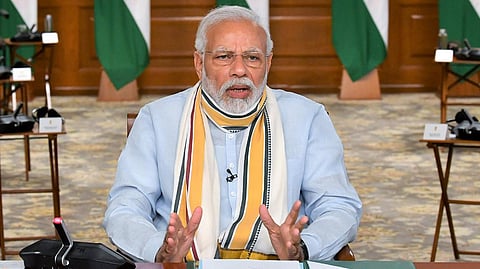Government has been dedicated to poor in last 10 years: PM Modi
NEW DELHI: Prime Minister Narendra Modi said on Monday that the country can develop only if various welfare schemes reach all, asserting that it is his guarantee that everyone - even those in the remotest of areas - will benefit from them.
Releasing the first instalment of Rs 540 crore to one lakh tribal beneficiaries of a rural housing scheme under the Pradhan Mantri Janjati Adivasi Nyaya Maha Abhiyan (PM-JANMAN) via video conferencing, he said the 10 years of his government have been dedicated to the poor.
Invoking Shabari, a tribal woman depicted in the epic Ramayana who served berries to Lord Ram during his stay in forests, the prime minister said it is natural for him to remember her when he has undertaken a special religious ritual till the consecration ceremony at the Ram temple in Ayodhya on January 22.
"The story of Shri Ram is not possible without Mata Shabari," he said, asserting that she played a big role in the transformation of 'prince' Ram into 'maryada purushottam' Ram.
"Be it the story of raja Ram in Treta Yuga or the current situation, welfare is not possible without uplifting the poor, deprived and the tribals," he said, noting that over four crore permanent houses were constructed for the poor in the last 10 years.
"Modi has reached out to those who were never cared for earlier," he added.
The budget of many welfare schemes for the Scheduled Tribes has risen by five times and the scholarship for tribal students has grown by two-and-a-half times in the last 10 years, he said, adding that the work is on to construct more than 500 Eklavya model school for them while only 90 existed earlier.
His government has exerted its full force to ensure that the extremely backward among the tribal population benefit from its every scheme, he said.
Modi also credited guidance from President Droupadi Murmu, India's first tribal woman head of state, for the PM-JANMAN scheme, saying as someone who has come from the same background she often spoke about the issues facing them during her interactions with him.
Noting that Diwali is being celebrated in Ayodhya in the run-up to the consecration of Lord Ram's idol at the temple there, he said the festival is also being celebrated in the homes of these one lakh families who have received the first instalment of the funds to construct their own houses.
This is a matter of big happiness for him, the prime minister said.
Those who were always ignored earlier have not only been reached out by him but also worshipped, he said.
During the event, Modi interacted with some beneficiaries of PM-JANMAN as they highlighted the positive changes in their lives after they availed various government schemes to get access to cooking gas connection, electricity, piped water and housing.
"It is the endeavour of our government that no one is left out of its welfare schemes," he said.
The first instalment of Rs 540 crore was released to beneficiaries of the Pradhan Mantri Awas Yojana-Gramin under PM-JANMAN which was launched for the socio-economic welfare of Particularly Vulnerable Tribal Groups (PVTGs) on November 15 on the occasion of Janjatiya Gaurav Diwas.
PM-JANMAN, with a budget of approximately Rs 24,000 crore, focuses on 11 critical interventions through nine ministries and is aimed at improving socio-economic conditions of PVTGs by saturating PVTG households and habitations with basic facilities such as safe housing, clean drinking water and sanitation.
It also seeks to provide improved access to education, health and nutrition, electricity, road and telecom connectivity, and sustainable livelihood opportunities.
Modi said the biggest beneficiaries of his government's 'Aspirational Districts Programme' to boost development in relatively backward districts are Scheduled Tribes.
Today the tribal society is seeing and understanding how our government is working for their culture and dignity," he said.
He asked people to stay away from middlemen and not pay any bribes, asserting that his government has simplified rules to ensure that people do not face any hindrance in accessing welfare schemes.

